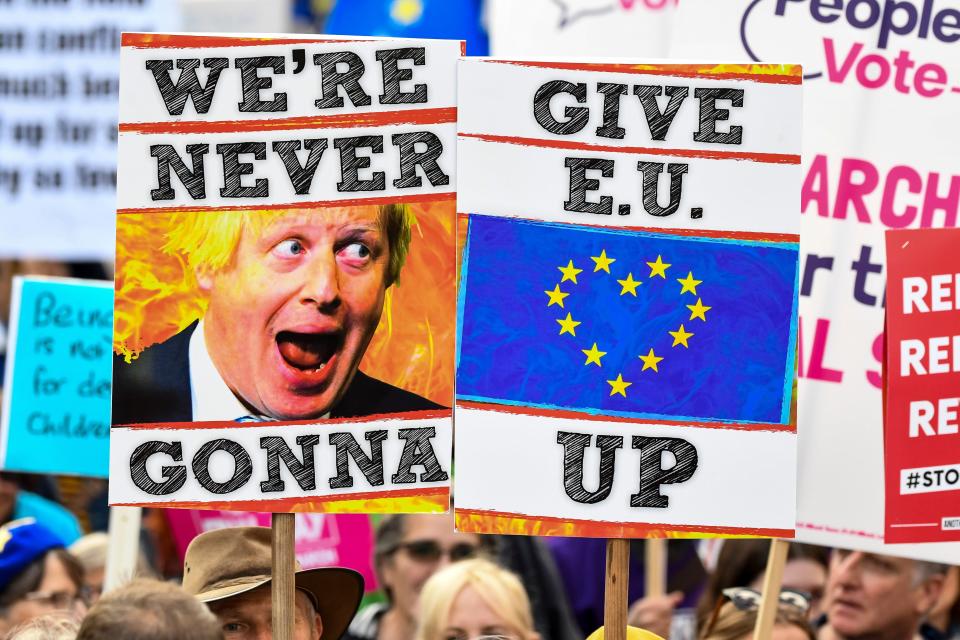UK economy delivered fresh blow as MPs ask for Brexit delay

The UK economy was delivered fresh blow again today as Members of Parliament (MP) backed a motion to further delay the process of Britain leaving the European Union.
Earlier today, dubbed Super Saturday, UK parliament held its first Saturday session in 37 years. UK prime minister Boris Johnson tried to convince MPs to support his agreement he made with the EU and MPs debated the proposal. Johnson said in a speech "now is the time to get this thing done," adding that delaying past the Brexit deadline of 31 October would be "corrosive."
Johnson’s cabinet threatened to postpone a vote on a revised deal if politicians voted to drag out Britain’s exit from the 27-nation bloc, again. However, MPs voted 322 to 306 to back a motion designed to rule out a no-deal exit — which is what will happen if politicians do not agree to Johnson’s new deal with the EU. It was tabled by independent MP Sir Oliver Letwin, which "withholds approval” for Johnson's Brexit deal until legislation implementing it has been passed.
READ MORE: Snap poll: Most UK firms push MPs to support Boris Johnson's Brexit deal
The UK prime minister will have to go to the EU and ask for an extension beyond the 31 October deadline. If he was successful in doing this, it would be the second extension the EU has granted the UK.
Johnson said he will press on "undaunted" with his Brexit strategy while the EU said it was up to the UK to "inform it of the next steps." Meanwhile, MPs signalled that a vote on Johnson’s revised Brexit agreement could now take place on Monday — however, this is up to the Speaker of the House of Commons.
Businesses are not happy

Earlier today, a snap poll of 650 business leaders revealed that 55% say that MPs should approve the deal prime minister Boris Johnson has sealed with the EU while41% think it should be rejected.
The survey by the Institute of Directors (IOD), one of the UK’s most prominent business organisations, also revealed that nine out of 10 IOD members also reject a no-deal Brexit, if parliament does not pass Johnson’s deal.
"The Brexit process has been frustrating and wearying for our members. The paralysis of the current situation prevents directors from moving forward with plans for investment and growth. By no means is there unanimity among business leaders on the path ahead, but avoiding a disorderly exit at the end of the month comes out clearly as a pressing priority,” said Jonathan Geldart, Director General of the Institute of Directors.
Meanwhile, Nigel Green, CEO of deVere Group — one of the world’s largest independent financial advisors — said: “One of the most important days in British political history became something of a damp squib as the Letwin Amendment rendered the Meaningful Vote meaningless.
“The prospect of a no-deal Brexit is now becoming increasingly likely. As such, the government is said to be upping its no-deal preparations and is set to introduce legislation needed for the UK to leave the EU on 31 October.
“The prime minister is clear that he will not negotiate a delay and says that the law doesn’t compel him to do so. He will tell EU leaders there should be no delays and that they should reject Parliament’s letter asking for a delay."
The national chairman of the Federation of Small Businesses (FSB) Mike Cherry said: “Many small business owners will groan with frustration at the continued uncertainty over a Brexit deal. But the important thing now is for MPs to focus next week on finding a way forward once and for all, which avoids leaving without a deal on 31 October and secures a transition period.
“The prolonged period of uncertainty caused by the political stalemate has left small firms in limbo, with investment plans on hold and confidence low. This can’t drag on. The Government and Parliament must now work together to ensure there is a deal which secures sufficient time for small businesses to adapt to the longer-term arrangements with the EU.”


